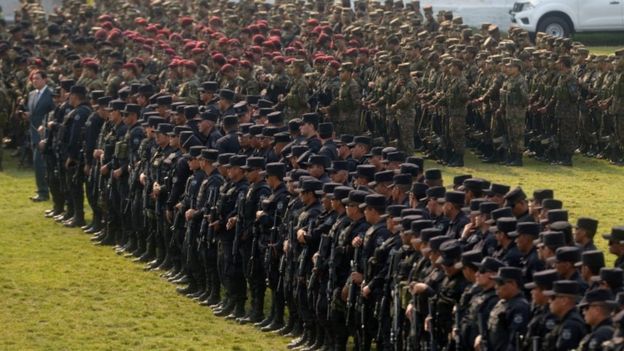El Salvador deployed an elite unit of soldiers and police officers to combat gangs that have migrated to the countryside, bringing what increasingly looks like a low-intensity conflict to the country’s rural areas.
On April 20, authorities unveiled the El Salvador Special Reaction Force (Fuerza Especial de Reacción El Salvador – FERES), which consists of 600 soldiers and 400 police officers and is equipped with helicopters, armored cars and assault weapons, reported the BBC.
Defense Minister David Munguia Payés said the elite squad will target gang members who have fled to the countryside following increased pressure from law enforcement in the cities, reported EFE.
“It is logical that a balloon effect happens, because when we target [the gangs] in urban areas they move to rural areas for protection, especially the leaders, to avoid capture,” Payés said.
Vice President Óscar Ortiz made assurances that the new force would aggressively target the gangs while also obeying the law.
The deployment of the squad is “a clear message that says to criminals that the state is stronger,” Ortiz said. The vice president added, however, that the security forces would respect human rights.
InSight Crime Analysis
With this deployment, it appears El Salvador’s government is expanding the scope of anti-gang operations to include the country’s rural areas. Until now the low-intensity conflict brewing between the government and street gangs has mostly been focused in the cities, where the gangs are believed to be the strongest. In May 2015, for example, authorities sent three battalions of special forces to the country’s major cities to help police combat the gangs.
SEE ALSO: El Salvador News and Profiles
It is indeed plausible that gang leaders have sought refuge outside the cities in order to escape pressure from law enforcement. There have been previous reports of Salvadoran gang members fleeing to neighboring Guatemala and Honduras for the same reason.
But widening the campaign against the gangs to the rural areas is unlikely to provide much better results than what authorities have achieved so far in the cities. Salvadoran security officials have taken an increasingly hard-line approach to combating the street gangs, even as violence levels rise at dizzying speeds. El Salvador became the most violent nation in the world not at war last year, and homicide rates have continued to climb during the first months of 2016.

